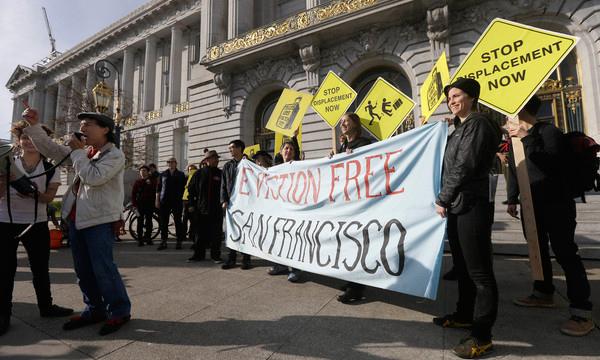San Francisco transit officials on Tuesday voted to implement a pilot shuttle bus program that will charge Silicon Valley tech companies like Apple and Google a fee to make pickups at public bus stops.
The San Francisco Municipal Transportation Agency (SFMTA) accepted terms of the pilot program amid protests regarding escalated cost of living and economic inequality within the city, reports the San Jose Mercury News.
"In my mind, the pilot project is clearly better than what we have now," said SFMTA Chairman Tom Nolan.
Under the plan, shuttle buses will have to pay $1 for each stop, which The Verge noted equates to roughly $1.5 million in fees over the pilot program's 18-month span. The city estimates medium size companies will pay around $80,000 per year, while larger businesses like Apple and Google will put in over $100,000.
Any money collected by the SFMTA is to be put back into the program to cover administrative fees, permits, enforcement and other related costs. California law prohibits profiting off the program.
Shuttle systems like those used by Apple and Google have been the target of activists who have turned the buses into a symbol for their fight against what they call economic inequality. Protestors claim a type of class war is being fought as high-income employees from big tech firms swarm into San Francisco, causing a housing costs to spike well above what an average citizen can afford. Former residents have said they were pushed out of the city due to the inflation.
Not all employees being shuttled back and forth from San Francisco are "billionaire riders," however. Regular working class citizens like Google program manager Crystal Sholts are among those caught in the middle of the so-called class warfare.
"I'm not a billionaire. Like many people, I'm still paying off my student loans," Sholts said.
San Francisco's pilot shuttle program is slated to start in July.
 AppleInsider Staff
AppleInsider Staff








 Charles Martin
Charles Martin
 Malcolm Owen
Malcolm Owen
 William Gallagher
William Gallagher

 Christine McKee
Christine McKee
 Wesley Hilliard
Wesley Hilliard

 Andrew Orr
Andrew Orr








35 Comments
As they already should have done. They get major tax breaks from one end of the coffeurs and this they can absorb. The funds will sustain public transit.
If it's a public stop, how can they charge anyone for using it? The public pays for it. Apple and Google will likely just tell people to wait 50ft up the road to avoid the issue.
If it's a public stop, how can they charge anyone for using it? The public pays for it. Apple and Google will likely just tell people to wait 50ft up the road to avoid the issue.
Totally agree. Do taxis get charged when they stop to pick up customers? What if I pull over to drop off someone or pick someone up. Will I be charged the $1? It's a racket that cities can block off public streets for public buses yet they want to charge others for using the street taxpayers already paid for.
Totally agree. Do taxis get charged when they stop to pick up customers? What if I pull over to drop off someone or pick someone up. Will I be charged the $1?It's a racket that cities can block off public streets for public buses yet they want to charge others for using the street taxpayers already paid for.
These are not public busses. These are private charter busses for the private employees of a particular corporation. Taxis must pay licensing fees to operate in the city, while providing a service to the general public. If you pull over to pick up or drop off someone as a matter of business, yes, you can be subject to regulation. If you are operating as a commercial driver, and you are not properly registered, you could even face fines and/or incarceration. That's why "gypsy cabs" are illegal.
The city would be well within its rights to force these private charters to purchase facilities off of the public way for their charter shuttle operations. Embarking and disembarking of passengers, by a charter operator, within the public way, can be regulated by a municipal government. The city also has a right to charge the shuttle operators a tax for operating their service within the city limits since the city is a primary place of operation of said business.
Busses are heavy and cause significant wear and tear on the city infrastructure. The city should be collecting revenue to offset these costs.
Wait, they're going to charge a fee that will raise $1.5 million, and the money will be used to pay for the cost of collecting the $1.5 million? Do I have that right?